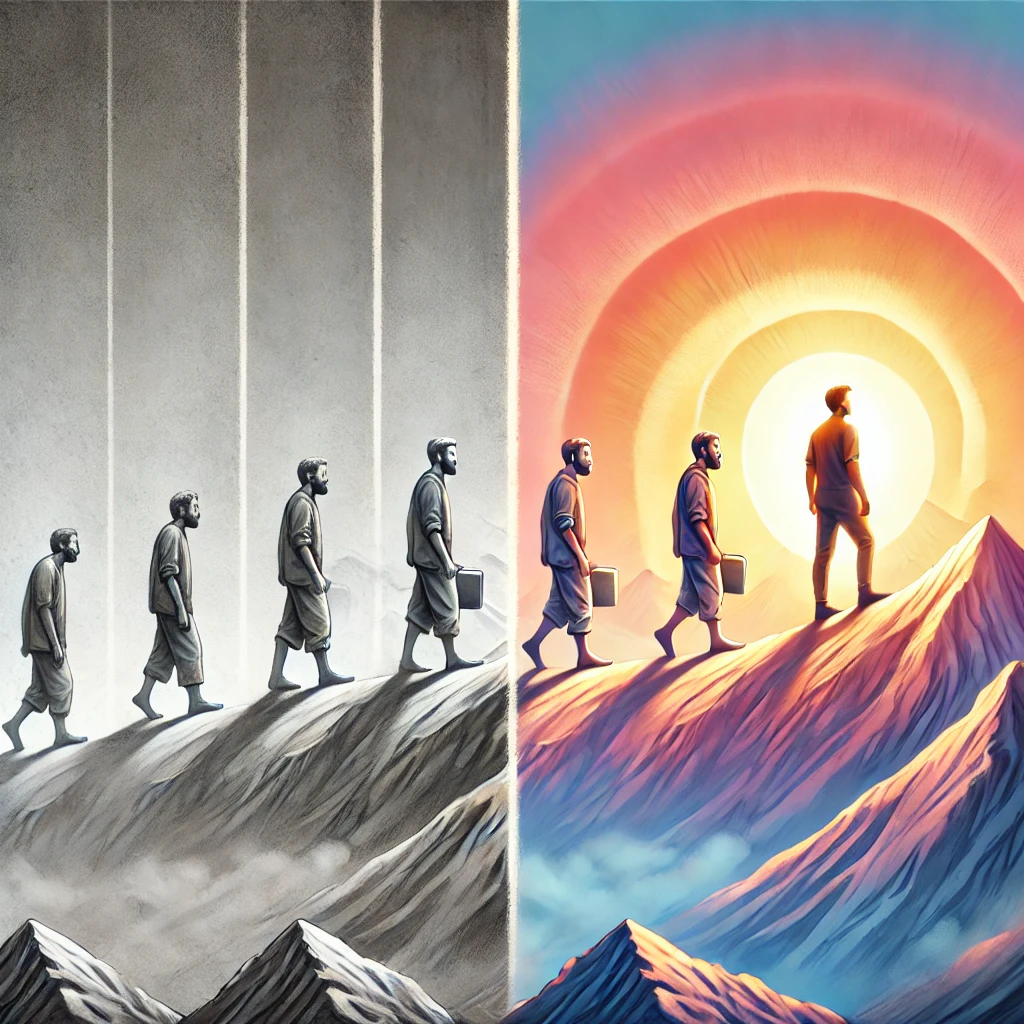In order to truly live, we must first die. Because only when we fully accept death can we live without fear.
To summarize this idea even more clearly:
“Each man has two lives, and the second one starts when he realizes he only has one.”
(A quote attributed to Confucius, popularized by Naval Ravikant in recent years.)

These are some strong statements right at the start, but I believe we don’t fully appreciate how much death shapes our lives. In most modern societies, death is largely hidden. We view it as something tragic—and, in all honesty, it often is, especially when someone close to us passes away. But in our daily lives, we rarely see it firsthand unless we are forced to. We almost never witness someone taking their last breath and simply ceasing to exist. Death has been removed from our immediate experience, confined to hospitals, where specialized personnel take care of it—because, to many, it is too ugly, too unsettling, and associated only with negative emotions. But why? Shouldn’t it be just as natural a part of life as birth?
Because we see death so infrequently, we develop the illusion that we will be here forever. This illusion causes more problems than we realize. The most significant one is the belief that we will always have enough time for the things we truly want—after we take care of the so-called “important” responsibilities imposed by society. Deep down, we know many of these things aren’t truly important at all.
I tend to believe that in the past—particularly in medieval times and earlier—people were more familiar with death and, as a result, more connected to life. This may sound contradictory, but witnessing death more often likely helped people accept it as an integral part of existence. They learned to move forward with their lives, carrying less fear, because they understood that death is natural and inevitable. If it’s unavoidable, then why waste time being afraid of it?
If we want to live fully—if we want to become the best version of ourselves or simply become the person we aspire to be—we must first say goodbye to our former selves. In a way, we must bury our old selves and allow a new version of us to be born. And we must do this every time we seek transformation, whether for better or worse. It’s the same cycle as life and death—just on a smaller scale.
To begin our “second life,” we must start living in the present. But let’s be honest—most of us, particularly in the Western world, live in a constant state of future-thinking. We save money so that someday we can buy a house, a car, or a laptop—because we’ve been led to believe it will make our future better. We go to school, then to work, to secure a “better future.” We want our children to have the best education so that they won’t have to worry about their future. And so the cycle continues—always chasing tomorrow, tomorrow, tomorrow. But that future never truly exists. It remains an illusion, like a dangling carrot we keep running toward but never get to bite.
So how do we change the rules of the game?
Ask yourself: When was the last time I did something purely because I wanted to, at this very moment—something that truly fulfilled my soul? Maybe it was taking a walk when you felt like it. Maybe it was getting up whenever you felt like it. Maybe it was simply choosing not to do something just because you didn’t want to. Chances are, it’s been a long time since you last did that—because life keeps throwing its own agenda at you. And we keep adjusting to that reality. But should we?
I don’t think we should. I think we need to pause—sit down, take a deep breath, wander through our thoughts, and reflect on what truly fulfills us. Then, we should pursue those things—every day, every moment. Because the only finite resource in our lives is time. And yet, we somehow forget this.
If you feel like taking a walk right now—go.
If you want to create art—do it.
Do what you love, and do it now.
Otherwise, at some point, you will run out of time. And there is no going back after that. All that will remain is regret over missed chances.
We are conditioned—by almost everything and everyone around us—to constantly think about the future. We are bombarded with messages telling us that what we have today is not enough, that we always need more, more, more. But in this endless pursuit of more, is there room for enough?
What if everything wouldn’t fall apart if we simply said, I have enough. I am happy. I am satisfied with my life. Maybe we don’t need to work so much in a job we don’t love. Maybe we can choose a less stressful job that gives us more time to enjoy our hobbies, our families, our passions.
By choosing to live in the present, we might realize that we have already achieved what our past selves once dreamed of. Maybe now, it’s time to actually enjoy it.
Has your second life already begun?
If not—when do you think it will?